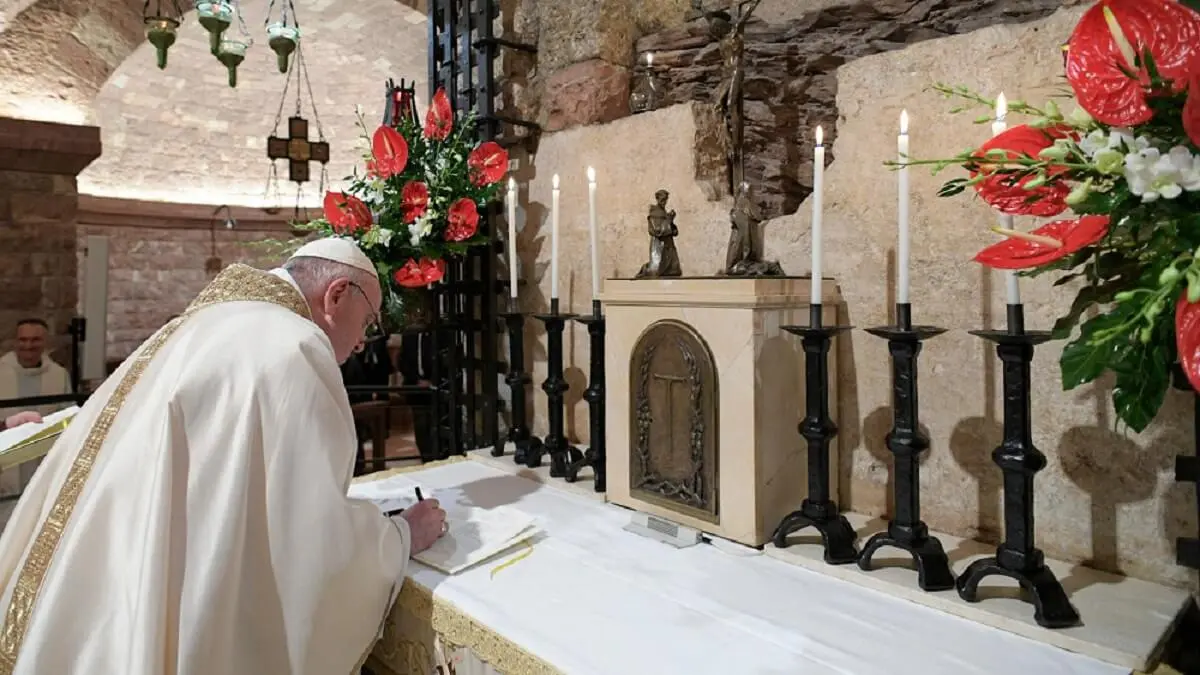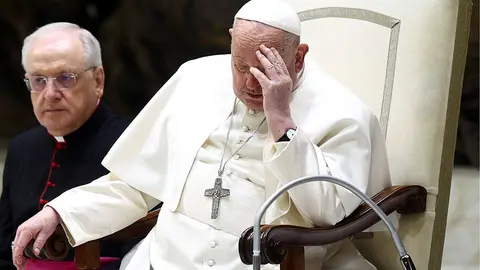‘Good morning, I am Francis’

Reluctant to accept the trappings of a life confined to the most noble rooms of the Vatican, Pope Francis I preferred to live and eat in the Santa Marta Residence, where he could be seen by everyone in the dining room and common areas. He would pick up the phone himself to call cardinals, bishops or simple priests, leaving them speechless with a simple: ‘Good morning, this is Francis.’
Among the many who have delved into the biography of Jorge Bergoglio, the one who has made the most acute and subtle synthesis is probably the Dominican Timothy Radcliffe, his personal friend: ‘Francis is a Jesuit dressed as a Dominican and embodied in a Franciscan.’ In short, he embodies in one person the three great religious orders of Catholicism, which are often at odds with each other. And this without even mentioning the Prelature of Opus Dei, John Paul II's favourite institute, which he preferred to the Jesuits as advisors and those in charge of the most delicate missions, both doctrinal and diplomatic.
‘The cardinals have gone to the end of the world to find me,’ said Francis when the conclave made him the first Latin American pope and also the first non-European, with the exception of the Syrian Gregory III back in the eighth century. He also continued the series of non-Italian popes that began with the Polish John Paul II, followed by the German Benedict XVI and himself, an Argentine whose parents managed, not without great hardship, to emigrate to a land that at the beginning of the 20th century dared to challenge the United States for world primacy as the great country of the future.
This awareness of being a child of emigration has marked one of the great features of Francis' pontificate: the defence of the right of every human being to seek their future freely without being treated as an illegal immigrant or a criminal. A message that, despite being on the verge of death, he personally conveyed to the Vice President of the United States, J. D. Vance, the last great world leader he received in audience.
Francis wanted to emphasise this trait as a defender of migrants when he made his first trip to the island of Lampedusa, located a few miles from Tunisia, which has been overwhelmed for several decades by a migratory wave, made up not only of Africans but also of many Asians fleeing wars and unspeakable misery in their own countries.
Emigration, in addition to climate change and his alleged appeasement of current dictators and tyrants, has earned him harsh criticism. Nicolás Maduro, Recep Tayyip Erdogan and Vladimir Putin have never been the subject of drastic condemnation by Pope Francis, who has never sought to justify himself. Those who have spoken on his behalf, especially his task force of eight cardinals, known as the C8, have always maintained that ‘Francis will never take the side of one country against another’ and, by extension, of one part of its population against another. This attitude has earned him at least the consideration and esteem of being regarded as the last peaceful voice on the international stage, now that Nelson Mandela is no longer with us, the Dalai Lama no longer speaks and the Nobel Prize winners have lost their aura.
Not everyone understands his message, and his ‘diplomatic neutrality’ is strongly criticised, especially in relation to certain conflicts (Russia-Ukraine, Hamas-Israel), ‘for putting aggressors and victims on the same level’. Like all his predecessors, Francis also leaves this world without ever having set foot in China. Although the Jesuits played a decisive role in the spread of Catholicism in China and Japan, no Pope has ever entered Beijing.
As for the Catholic Church itself, Bergoglio took over from a Ratzinger exhausted by internal struggles within the Curia. Since his election in the 2013 conclave, Francis has stood firm against those who resisted abandoning pomp and circumstance. Guided by a fourfold motto – humility, service, closeness and compassion – Bergoglio advocated the ‘theology of the people’, the Argentine, non-Marxist variant of Latin American ‘liberation theology’, which placed the excluded at the centre and emphasised the value of popular culture.
It took him nine years to achieve the reform of the Roman Curia, embodied in the apostolic constitution ‘Praedicate evangelium’, which has opened the door for lay people, including women, to assume positions of government and responsibility. This was a momentous reform, which Francis managed to partially complete after many decades of attempts by many of his predecessors in St. Peter's chair. The College of Cardinals that will elect his successor is currently made up of 80% members chosen by him, which suggests their loyalty to Francis' reformist thinking.
Finally, two more urgent issues have marked his entire pontificate and brought him misunderstanding and the harshest attacks against his person: paedophilia and his defence of life. With regard to the former, his firm stance of condemnation and removal of those who have abused minors has been relentless, despite the fact that the most bitter enemies of the Catholic Church strive to water down the energetic measures ordered by Francis, while at the same time displaying a clear determination to exaggerate any inappropriate behaviour on the part of a priest, while viewing with exquisite tolerance the abuses of people who profess other beliefs, especially if they are politicians or assimilated into the same camp.
As for the right to life and his condemnation of artificially induced abortion, Francis has always been consistent with one of the firmest pillars of the Church: the unquestionable defence of the most vulnerable, especially the most defenceless and helpless, that is, the ‘nascituri’. This position has unsettled those who initially hailed him as a ‘progressive pope’.
They are probably the same people who criticised him for not attending the solemn reopening of Notre Dame Cathedral in Paris, a ceremony which, in addition to recognising the colossal restoration work carried out by a staunchly republican and secular France, brought together the cream of the world's political leadership. Francis declined to preside over or even attend such a grand display of pomp and grandeur, preferring instead to visit Ajaccio, the capital of the island of Corsica, and celebrate a popular act of piety there. Those who knew him well said that ‘it was a decision closely linked to his family culture - and that of Argentina - which he considers a major vector of faith “to win back the hearts of men”. This is yet another task for whoever succeeds the 266th pope of the Catholic Church.


